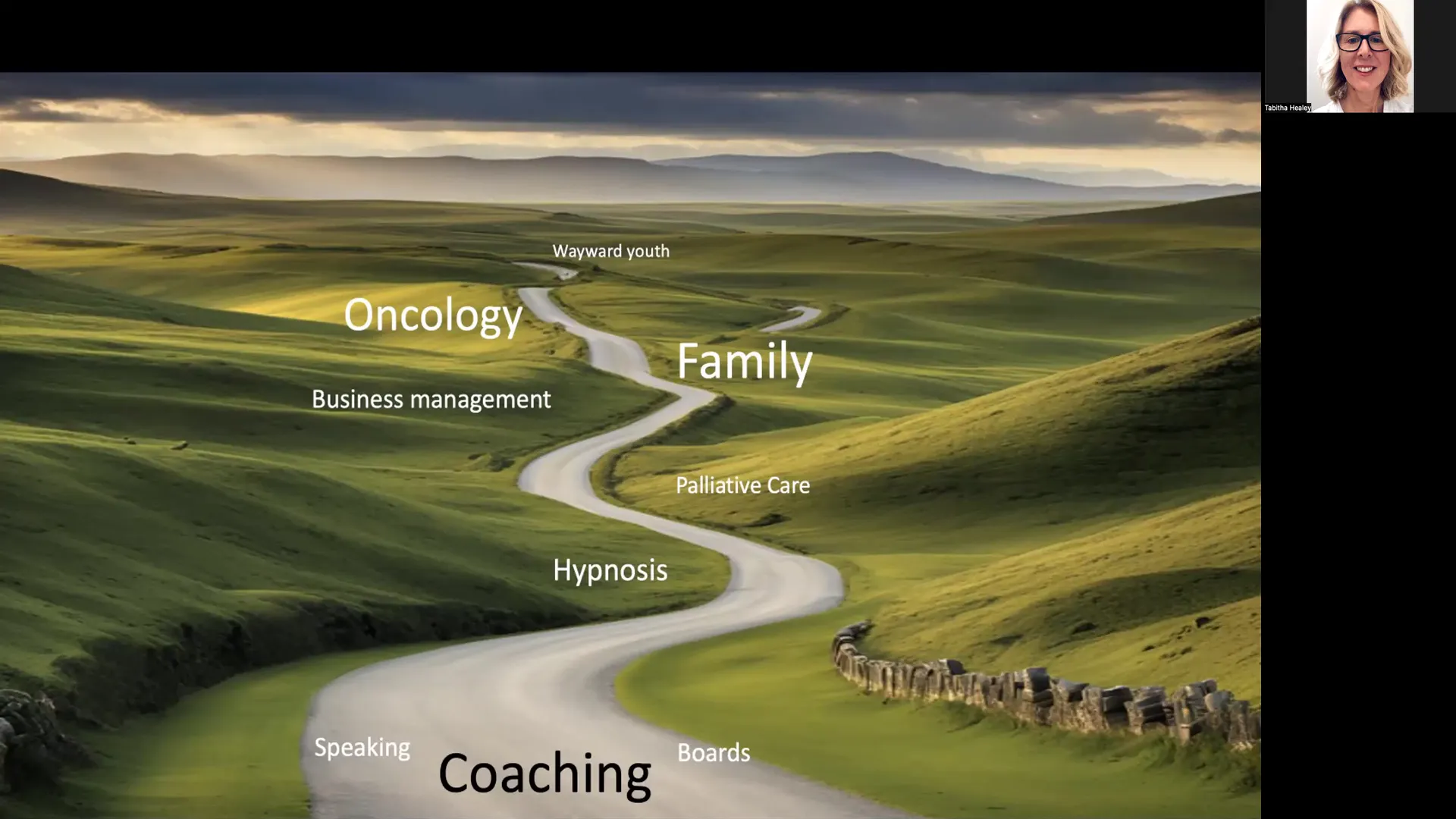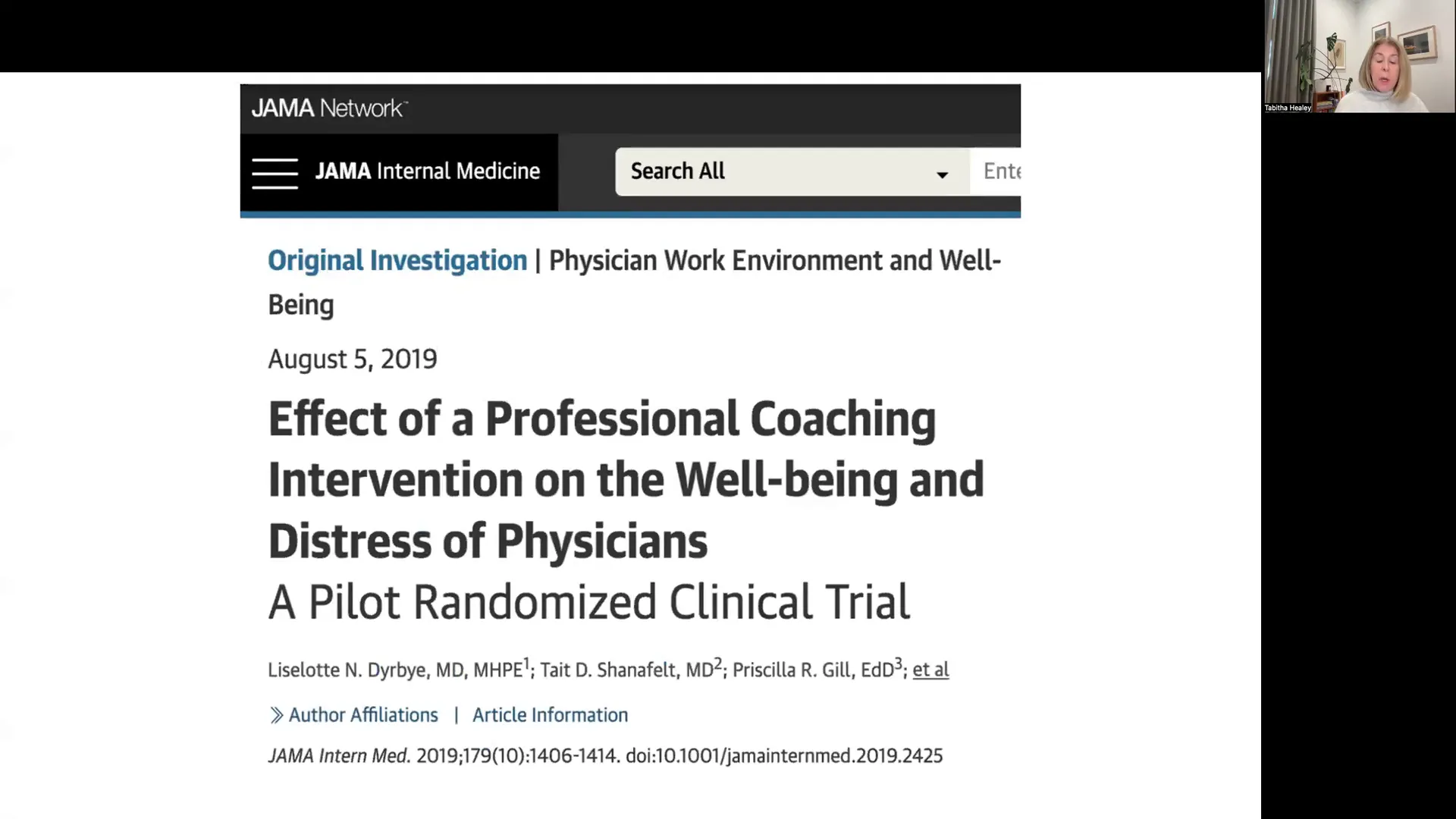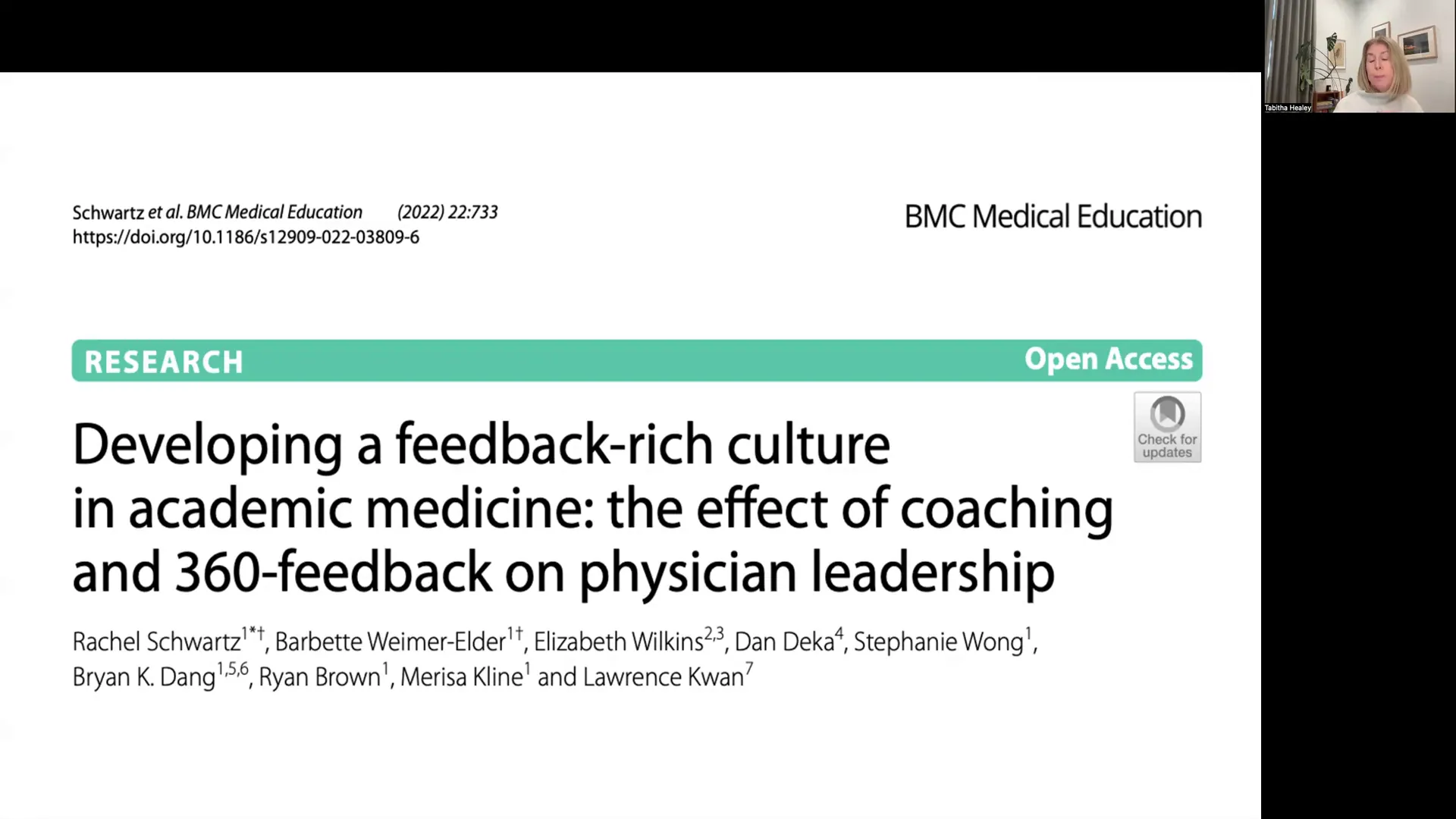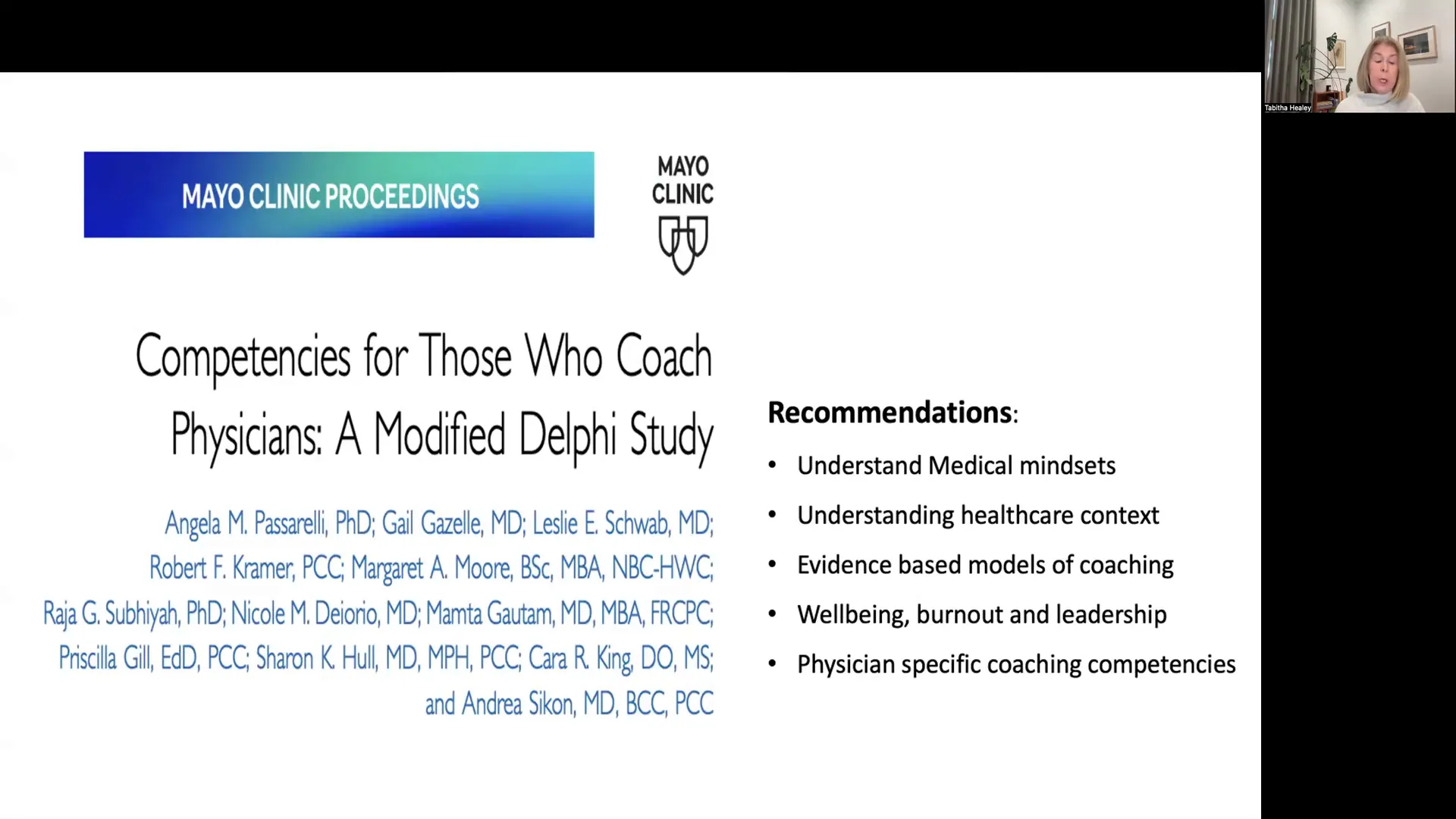Evidence for Coaching for Doctors: A Step-by-Step Guide for why every doctor deserves a coach.
In this guide, we explore the growing field of coaching for doctors, highlighting the evidence for coaching for doctors, including coaching’s significant benefits in enhancing well-being, preventing or remediating burnout, and improving professional performance. Whether you’re a physician seeking personal growth or looking to incorporate coaching techniques into your practice, read on to learn valuable insights and actionable steps about the evidence for coaching and coaching benefits for doctors.
Table of Contents
Step 1: Understanding the Need for Coaching 🌱
Coaching for doctors is essential in today’s healthcare landscape with an increasing number of doctors feeling overwhelmed by their responsibilities. The rising expectations and relentless demands on the medical profession can lead to stress, burnout, and feelings of inadequacy. The pressure of juggling patient care, administrative tasks, and personal obligations can lead to a decline in mental health and job satisfaction.
Recognizing the impact of caring for others, often at the expense of caring for self, is the first step in understanding the valuable role coaching can play for doctors in achieving sustainable personal and professional success. Coaching provides a structured support system that empowers and equips doctors to set achievable goals and develop strategies to enhance their well-being and professional performance.
Step 2: My Journey into Coaching 🚀

After 20 years as a Medical Oncologist, I experienced increasing overwhelm, an unsettling level of detachment and realized I had lost the capacity for kindness in my practice.
Seeking help from a career coach changed my perspective. I realized I was more interested in prevention of illness than palliation of disease, and everything I read and listened to was in the realm of well-being and peak performance, not the latest medical research findings. This experience opened my eyes to the potential of coaching, leading me to pursue formal training in this field.
I became a qualified Executive and Organizational Coach at the time that Covid was inflicting extraordinary levels of distress on the community and medical profession. I found that my personal experience as a medical specialist, coupled with my coaching knowledge allowed me to support and empower colleagues in distress and my coaching practice has grown steadily from there.
Step 3: What is Coaching? 🎯
Coaching is a collaborative process aimed at enhancing personal and professional growth. It focuses on the present and future, helping individuals identify their goals, let go of patterns of thought and behavior that constrain them and develop actionable strategies.
Unlike therapy, coaching does not delve into past traumas, it does not require you to talk through previous distress and events. Instead, it empowers clients to harness their strengths and overcome obstacles. This forward-thinking approach is especially beneficial for doctors, who often deal with high-stakes situations and are motivated to maximize their performance.
Step 4: The Role of Coaching in Medicine ⚕️
Coaching plays a vital role in the medical field by addressing the unique challenges faced by healthcare professionals. It fosters resilience, enhances communication skills, and promotes a healthy work-life balance.
Doctors who engage in coaching report improved job satisfaction and a renewed enthusiasm for their work. Coaching helps them reconnect with their purpose and enhances their ability to provide quality care to their patients.

Step 5: Common Areas of Coaching for Doctors 🩺
- Burnout Prevention: Coaching helps doctors identify stressors and develop coping strategies.
- Work-Life Balance: It encourages setting boundaries to maintain personal well-being.
- Leadership Development: Coaching enhances leadership skills, crucial for managing teams effectively.
- Career Transitions: It supports doctors navigating changes in their professional paths.
- Performance Improvement: Coaching assists in honing clinical skills and improving patient interactions. Coaching can elevate study, exam and interview performance.
- Wellbeing: Coaching assists doctors in prioritizing self-care, recognizing that this foundation is essential in caring for others, maintaining relationships and ensuring longevity in their chosen field.
Step 6: The Impact of Burnout and How Coaching Helps 🔥
Burnout is a significant issue in medicine, with many doctors experiencing emotional and physical exhaustion, depersonalization and becoming less effective in their work. Coaching addresses these challenges by providing a safe space to explore feelings, develop coping strategies and address organizational aspects of how they are working.
Doctors who incorporate coaching into their professional development have been demonstrated to have greater work engagement, personal and professional satisfaction, work-life balance and reduced burnout and stress. This has a direct impact on improving patient satisfaction and outcomes.

Step 7: Data Supporting Coaching Effectiveness 📊
In coaching research there are challenges with small sample sizes and poor standardization of coach qualifications and the nature of the interventions. There is a lack of standardized reporting and outcome measures but on the flip side – coaching is relatively cheap, very safe and without side effects, although some clients do become addicted to the benefits. Research supports the effectiveness of coaching in improving various outcomes for doctors. A systematic review revealed significant benefits in burnout, well-being, and work-life balance among participants who received coaching.
Studies have shown statistically significant improvements in stress levels, emotional exhaustion, compassion and overall quality of life. These findings underscore the value of coaching as a tool for enhancing the professional and personal lives of healthcare providers.
Step 8: Why every doctor deserves a coach 🌟
Coaching has the potential to transform lives, particularly in medicine. I have clients so overwhelmed they cannot see a way of continuing to work, others seek coaching to equip them to excel in their career development and many more who are seeking ways to integrate their personal and professional lives to achieve greater happiness and fulfilment.
It is often small, simple, consistent shifts that create the greatest change in a person’s life. I have worked with many doctors who have grappled with crippling workloads, limited support structures and disillusionment with medical practice. Coaching supports clients to identify where they do have control and to identify the changes that they can make. This may be as simple as getting up 15 minutes earlier to carve out moments of peace, quiet and reflection, it may be changing their relationship with alcohol or technology, or implementing changes in the structure of their clinics. Whilst there are universal themes affecting the wellbeing of doctors, each client is unique in their reaction to circumstances and their approach to change.
Step 9: Leadership Skills Development Through Coaching 🏆
Leadership is a natural and crucial element of medicine. Whilst clinical and technical skills are well taught, leadership skills are often just expected to be a natural trait or absorbed on the job.
Coaching focuses on developing self-awareness, emotional intelligence, and effective communication—skills vital for successful leadership. A study revealed that doctors who participated in coaching reported enhanced clarity of purpose, improved understanding of their organization and greater ability to lead teams effectively.

Moreover, coaching encourages proactive leadership, where physicians learn to navigate complex situations and make informed decisions. This proactive approach not only benefits physicians but also enhances patient care and team dynamics.
By investing in coaching, doctors can become more effective leaders, positively impacting their colleagues and patients alike.
Step 10: Navigating the Unregulated Coaching Industry ⚠️
The coaching industry is largely unregulated, which presents challenges in finding qualified professionals. It is essential for doctors to seek coaches with appropriate credentials and experience.
When choosing a coach, consider their background, training, and specialties. Look for coaches who understand the unique challenges faced by medical professionals. The Doctors Who Coach Doctors website is a valuable resource for connecting with qualified coaches.

Research published in 2024 by The Institute of Coaching, based at Harvard, recommends the following competencies for Coaches that coach doctors.
- Understanding the unique mindsets commonly encountered in medical professionals – perfectionism, imposter syndrome, highly self-critical, competitive.
- A strong grasp of the healthcare context – electronic medical records and their challenges, risk or experience of litigation, the complexity of work, high levels of responsibility that cannot be switched off and diverse and significant ethical challenges.
- The importance of the use of evidence based models of coaching.
- Be able to navigate the most common issues for which doctors seek coaching – burnout, wellbeing and leadership.
Step 11: Accessing Coaching Services 📞
Accessing coaching services can greatly enhance personal and professional development. Many coaches offer both in-person and online sessions, making it easier to find a suitable option. Some coaches will specialize in particular areas, such as burnout, exam preparation and performance, career transitions and so I recommend you explore your options to find a coach that you connect well with and who can support you in achieving your particular goals.
Cost may be a consideration, but if you look at the investment doctors have made in their career, the sunk costs are SIGNIFICANT – time, money, emotional load, sacrifices made – the return on your investment with coaching is huge – particularly if it allows you to continue to practice safely and sustainably. So many clients I have worked with arrive saying, “that’s it, I am done” and by coaching them through the way they work and the way they look after themselves we can re-ignite their love and enjoyment of medicine and re-engage them in their lives
Many organizations will provide funding for professional development, which can cover coaching expenses. Additionally, coaching may qualify for tax deductions as a business expense.
Step 12: Why Learn to Coach? 📚
Learning to coach can be a powerful tool for doctors, enhancing their ability to support patients and colleagues. Coaching skills can transform clinical interactions, making them more effective, increasing patient satisfaction, engagement and compliance, empowering them to take charge of their own health.
A significant regret is that I did not equip myself with coaching skills and strategies whilst still practicing medicine. I can see now what an incredible impact it has on connection, collaboration, communication and as a result outcomes and engagement.
Rather than seeking to solve everyone else’s issues, coaching provides you with a style of questioning that empowers patients or colleagues to identify the changes they want to make and connects them to their why, motivating them to change. Coaching makes you a much better communicator, leader, partner or parent because working with someone to support them to succeed is much more effective than fixing the issue for them.
Coaching can help clinicians manage challenging team dynamics and improve leadership skills. It equips doctors with the ability to navigate complex situations, enhancing their role within healthcare teams. Ultimately, learning to coach not only benefits individual practitioners but also elevates the entire healthcare system.
FAQ: Common Questions About the Evidence for Coaching for Doctors ❓
What is the difference between coaching and therapy?
Coaching focuses on future goals and personal development, while therapy addresses past issues and emotional healing.
How can I find a qualified coach?
Start by visiting reputable directories, such as Doctors Who Coach Doctors, to connect with qualified professionals.
Is coaching worth the investment?
Yes, coaching can lead to significant improvements in well-being, job satisfaction, and performance, making it a valuable investment for doctors.
Can coaching help with burnout?
Absolutely! Coaching provides tools and strategies to manage stress, improve work-life balance, and prevent burnout.
What should I expect from a coaching session?
Coaching sessions typically involve goal setting, discussions about challenges, and strategies for personal and professional growth. Coaches tailor their approach to meet individual needs.
Find a Doctor Coach!
Check out the Directory



